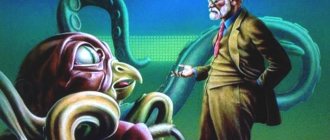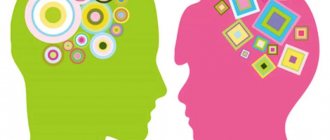SOCIAL TYPES OF CHARACTER ACCORDING TO FROM
Erich Fromm, discussing the “biological imperfection” of a person, noted that the first sign that distinguishes human existence from an animal has a negative characteristic, namely, the relative lack of instinctive regulation in the process of adaptation to the surrounding world. The method of adaptation of animals, writes Fromm, is the same everywhere: if instinctive support ceases to meet the requirements of successful adaptation to the surrounding world, then the corresponding biological species becomes extinct [Fromm, 1993]. character it has , and vice versa. Thus, since the behavior of animals is instinctively determined, this means that they have no character . This doesn't mean that animals don't have personalities. Animals have individuality, everyone knows this [Fromm, 1994]. Thus, character can be considered as a substitute for the instinctive apparatus of animals. Since energy is channeled in a certain way, this means that actions are performed by the individual “in strict accordance with character.”
Fromm identified five social types of character that prevail in modern societies. These social types, or forms of establishing relationships with others, represent the interaction of existential needs and the social context in which people live. Fromm divided them into two large classes: unproductive (unhealthy) and productive (healthy) types. The category of unproductive ones includes receptive, exploiting, accumulating and market types of character. The category of productive represents the type of ideal mental health in Fromm’s understanding. Fromm noted that none of these character types exists in a pure form, since unproductive and productive qualities are combined in different people in different proportions. Consequently, the influence of a given social character type on mental health or illness depends on the ratio of positive and negative traits manifested in the individual.
1. Receptive types are convinced that the source of everything good in life is outside of themselves. They are openly dependent and passive, unable to do anything without help, and think that their main task in life is to be loved rather than to love. “They are extremely sensitive to abandonment or abrupt rupture of relations with them by those they love. If such people are smart, they will be better listeners, since their orientation is related to the absorption of ideas, rather than their production; Left to their own devices, they feel inadequate. Such people tend to look for someone who would give them the information they need, instead of making at least a minimum of effort and getting it themselves. If such people are religious, then their understanding of God is such that everything they expect, they expect from God, and not from their own activities. If they are not religious, then their attitude towards people or towards social institutions is still the same: they are always looking for a “good wizard”. They always feel a special sense of devotion to the giving hand and always experience the fear of losing it. But since they need the support of many to feel safe, they are forced to show loyalty to the majority of people. It is difficult for them to say “no”, and they easily make promises to confirm their devotion. Since they cannot say no, they love to say yes to everyone; but the resulting paralysis of the critical faculty makes them highly dependent on others.
They are dependent not only on authorities in matters of knowledge or help, but also in general on people who provide them with at least some support. Alone, they feel completely lost, because they are unable to do anything without outside help. This helplessness affects especially those matters that by their very nature require independence, namely in making decisions and bearing responsibility for them. As for interpersonal relationships, they ask for advice from those in relation to whom they must make this or that decision.
Subjects with a receptive orientation enjoy good food and drink. To cope with anxiety or suppress depression, they eat or drink something all the time. The most prominent and expressive feature of their face is their mouth; the lips are half-open as if they are constantly preparing to eat. And even in their dreams, satiety often symbolizes love for them, and hunger symbolizes depression and disappointment.
In general, individuals with a receptive orientation have an optimistic outlook and friendliness. They have a certain trust in life, but fall into a state of anxiety and even madness if their “source of support” is threatened. They are often genuinely warm-hearted and have a genuine desire to help others, but helping others involves a certain amount of support from those favored. Receptive individuals can be characterized as passive, trusting and sentimental. In extremes, people with a receptive orientation can be optimistic and idealistic.
2. Exploitative types take whatever they need or dream of, either by force or ingenuity. They, too, are incapable of creativity, and therefore achieve love, possession, ideas and emotions by borrowing all this from others. The exploitative orientation, like the receptive one, is based on the postulate that the source of all benefits is external, that everything that a person would like to receive, he must look for outside, and not achieve on his own. The difference between the two is that people with an exploitative orientation do not expect help from others as a gift, but take it away by force or deception. This orientation is evident in all areas of activity.
In the area of love and feelings, these people have a tendency to seize and steal. They are only attracted to those who can be taken away from another. Attractiveness to them stems from a person's attachment to someone else; they tend not to fall in love with those who belong to no one else.
The same thing manifests itself in intellectual activity. Such people do not strive to produce ideas, but to steal them. This can be done either crudely, in the form of plagiarism, or more subtly, by verbally varying someone else's idea and then presenting it as one's own. The lack of original ideas or independent results of otherwise gifted people, according to Fromm, is explained more by the type of orientation of their character than by an innate lack of originality. The same is true in their relation to material things. Things that can be taken away from others always seem more attractive and better to them than their own. Their motto is “stolen goods are always sweeter.” Since they seek to exploit people, they “love” only those who can be exploited, both explicitly and implicitly. A striking example of this type of orientation would be kleptomaniacs, who only like stolen things, even if they have the money to buy them.
A symbol of this type of orientation can be an angry mouth line. They often make poisonous remarks about others. Their attitude towards others is colored by a mixture of hostility and the desire to manipulate them. Any person is an object of exploitation for them and is perceived only from the point of view of his usefulness. Instead of the trust and optimism characteristic of people with a receptive orientation, these people are suspicious, cynical and exude envy and jealousy. Since they are only satisfied with the things they take from others, they tend to undervalue what they have and overvalue what others have.
The negative traits of an exploitative character are aggressiveness, arrogance and self-confidence, self-centeredness and a tendency to seduce. Positive qualities include self-confidence, self-esteem and impulsiveness.
3. Accumulating types try to possess as much material wealth, power and love as possible; they strive to avoid any attempts on their savings. Unlike the first two types, “hoarders” gravitate toward the past and are scared off by everything new.
While the receptive and exploitative types of orientation are the same in that they are aimed at an external source of obtaining what is required for life, the accumulative orientation in this respect differs significantly from them. Everything new that can be gleaned from the outside causes a feeling of mistrust in people of this type of character. The security of these people is based on accumulating and preserving what they have already accumulated, while spending is perceived by them as a threat. They seem to protect themselves from the outside world with a defensive wall, and their main goal is to bring as much as possible inside this fortress and take out as little as possible from it. Their stinginess extends equally to money, feelings, and thoughts. Love for them is possession, possession; they do not give love, but try to take possession of the “beloved.” Individuals with a hoarding orientation often exhibit a kind of devotion to people and attachment to memories. Due to sentimentality, they see the past as golden days; they hold on to it and indulge in the pleasure of remembering past feelings and experiences. They know a lot, but are sterile and incapable of productive thinking.
These people, Fromm believed, can also be identified by facial expressions and gestures. They are silent, their gestures indicate their isolation. If people with a receptive type of orientation have gestures that are round and inviting, and those with an exploitative type of orientation are aggressive and harsh, then for people with an accumulative type of orientation they are angular and stiff, as if they want to establish a boundary between them and the outside world. Another characteristic feature of these people is a commitment to order to the point of pedantry. A person of this type always has order in things, thoughts and feelings, but, as in the case of memory, his neatness is sterile and rigid. He does not tolerate when things are not in their usual place and automatically lays out and places everything in its place. For him, the outside world always contains the threat of penetration beyond the border he has erected, so accuracy means a way to get rid of this threat by pushing away and maintaining a certain distance in relation to the outside world. Fanatical cleanliness is another manifestation of the need of a person with this type of orientation to “clean up” from contacts with the outside world. Everything that does not belong to his world seems dangerous and “unclean” to him, and he constantly washes his hands, washes himself, performing something like a ritual of religious ablution, prescribed after each touch of “unclean” people or things. As for things, they should not only be in their place, but also in their time. Obsessive punctuality, which is also one of the ways to avoid threats from the outside world, is a characteristic feature of people with this type of orientation. If they perceive the outside world as a threat, then the logical reaction to it is stubbornness. Constantly saying “no” is an almost automatic defensive reaction. These people think that they have a very definite reserve of strength, energy, mental abilities and that this reserve is gradually decreasing and depleted and will never be restored. They do not understand that living substance is inherent in the function of self-replenishment and that activity and waste of energy leads to their increase, while stagnation and stagnation lead to their complete paralysis. For them, death and destruction seem more real than life and growth. Acts of creativity are a miracle that they have heard about, but do not believe in. Their highest values are order and security; their motto is “there is nothing new under the sun.” In relationships with other people, intimacy is also perceived as a threat; therefore, safety is guaranteed either by moving away from a person or by mastering him. People with this type of orientation are prone to suspicion and have a peculiar sense of justice, which, in essence, can be expressed in the words: “what is mine is mine, and yours is yours” [Fromm, 1993]. They resemble Freud's anal-retentive personality: rigid, suspicious and stubborn. According to Fromm, they also have some positive characteristics - prudence, loyalty and restraint.
4. The market type is based on the belief that personality is valued as a commodity that can be sold or profitably exchanged. These people are interested in maintaining a good appearance, meeting the right people, and are willing to demonstrate any personality trait that would increase their chances of success in selling themselves to potential customers. Their relationships with others are superficial, their motto is “I am what you want me to be.” Market orientation has predominantly developed and crystallized in the modern era. To understand its nature, one should take into account the economic function of the market in modern society, not only from the point of view of analogy with this type of character, but also as the basis and main condition for the development of this type of character in modern man.
Barter is one of the most ancient economic mechanisms. However, the traditional local market differed significantly from the modern capitalist market. Trading at the local market gave people the opportunity to meet for the purpose of exchanging consumer goods. Product producers and buyers got acquainted; they formed rather small groups; demand was more or less known so that commodity producers could produce just enough goods to satisfy this demand.
The modern market, on the contrary, not only does not represent a meeting place between commodity producers and buyers, but is characterized by abstract and impersonal demand. The product is produced for this market, and not for a certain circle of buyers; decisions are made based on the laws of supply and demand, which determine whether a product will be sold and at what price. The regulatory function of the market has been and remains dominant in influencing the formation of the social character of the urban middle class, and through it, the entire society as a whole. The market concept of value causes a tendency to treat people, especially oneself, from the same positions. Fromm called the orientation of character, which is characterized by a deep attitude towards oneself and other people as a commodity, the value of which is determined by exchange value, “market orientation”.
In addition to being extremely aloof, market orientation can be described by the following key personality traits: opportunistic, aimless, tactless, unscrupulous, and empty-handed. Their positive qualities are openness, curiosity and generosity.
5. In contrast to unproductive orientation, productive character represents, from Fromm’s point of view, the ultimate goal in human development. This type is independent, honest, calm, loving, creative and performs socially useful actions. It is clear from Fromm's works that he viewed this orientation as a response to the contradictions of human existence inherent in modern society. It reveals a person’s ability for productive logical thinking, love and work. Through productive thinking, people learn who they are and therefore free themselves from self-deception.
The typological structure built by Fromm presupposes a certain kinship of individual types, which realizes itself in the process of assimilation and socialization. In the table provided by Fromm it looks like this:
| ASSIMILATION | SOCIALIZATION | ||
| I. | UNPRODUCTIVE ORIENTATION | ||
| a) | Receptive (receiver) | Masochistic (addiction) | SYMBIOSIS |
| b) | Exploitative (taking) | Sadistic (authoritarianism) | |
| c) | Cumulative (saving) | Destructive (impudence) | ALIENATION |
| d) | Market (exchange) | Indifferent (plausibility) | |
| II. | PRODUCTIVE ORIENTATION | ||
| Producing | Loving, intelligent |
The power of productive love enables people to passionately love all life on Earth ( biophilia ). Fromm defined biophilia in terms of caring, responsibility, respect, and knowledge. Biophilia is opposed to necrophilia - a craving for everything dead and lifeless. Fromm describes not only necrophilic individuals, but also entire necrophilic civilizations (such a civilization can be considered, for example, Nazi Germany). Biophilia is a necessary condition for the formation of a productive character. Finally, productive work provides the ability to produce the necessities of life through creative self-expression. The result of the implementation of all the above forces, which are characteristic of all people, is a mature and holistic character structure.
Essentially, productive orientation in Fromm’s humanistic theory is the ideal state of a person. Hardly anyone has achieved all the characteristics of a productive personality. At the same time, Fromm was convinced that as a result of radical social reform, the productive orientation could become the dominant type in any culture. Fromm envisioned a perfect society as one in which basic human needs are satisfied. He called this society humanistic communal socialism.
Fromm's theory attempts to show how broad sociocultural influences interact with unique human needs in the process of personality formation. His fundamental thesis was that character structure (personality types) is related to certain social structures. In keeping with the humanist tradition, he also argued that radical social and economic change could create a society in which both individual and social needs could be satisfied.
Fromm's books do not lose their popularity both in professional circles and among ordinary readers around the world. Countless people find his compelling and thought-provoking commentary on a wide range of social issues relevant to our time.
GLOSSARY ON THE TOPIC
Humanistic psychoanalysis. Fromm's theory of personality, which emphasizes the role of sociological, political, economic, religious and anthropological factors in the formation and development of an individual's character.
The accumulating character type is a stingy, stubborn and past-oriented person.
The need for identity is the uniquely human need to perceive oneself as different from others.
The need for roots is the existential human need to be an integral part of the social world; the need to feel that one belongs to it.
The need to overcome is a basic human need to overcome the passivity of animal nature in order to become an active and creative creator of one’s life.
The need for belief system and commitment is the individual's need for a stable and meaningful belief system to explain the complexity of the social and physical worlds.
The need for connection is a basic human need to care for and participate in others.
A productive character type is a holistic, loving and creative individual. Represents the ideal ultimate goal in the development of humanity.
Market type of character - a person who evaluates himself as a commodity that can be profitably sold or exchanged; extremely alienated from others.
An exploitative character type is a person who gets what he wants from others by force or deception.
Consumer type
A person believes that the source of all benefits is outside, and is determined to passively perceive these benefits. This is an “eternal sucker” in all types of its activities. For example, in love he desires to “be loved,” but not “to love.” Left to himself, at least temporarily, he becomes lost and becomes, as it were, paralyzed. This is the type of “crawler” who is devoted to the “giving hand” and is afraid of losing it. Its typical traits are passivity, submissiveness and timidity. This type is formed as a result of the fact that the child realized himself in childhood as a passive appendage to the relationship of his parents.
Character concept
What do we mean by this term? The word "character" translated from Greek means "seal." In psychology, this concept means a set of personality characteristics that are formed during the period of growing up and clearly manifest themselves later in the personal and social life of a person. The result of this process is stable and uniform behavior of the individual in certain situations.
However, permanent character traits of a person in psychology are not identical to the characteristics that a person has. A simple example can serve as confirmation of this. A person, finding himself in a stressful situation, showed rudeness and lack of restraint. But we understand perfectly well that such behavior does not mean that he has exactly that kind of character. It is possible to talk about the inherent personality traits only with the regular manifestation of such incontinence.
To define the concept of “people’s characters” in psychology, many decodings and deep definitions are used. But most often this term means the following:
- a system of sustainable behavior that contributes to the formation of a personality type;
- the line located at the junction between the inner world of an individual and the surrounding reality in which he finds himself, or the way a person adapts to the outside world;
- a pronounced system of behavioral reactions to specific stimuli.
Psychological theory
In his first semantic work, Escape from Freedom, first published in 1941, Fromm analyzes the existential state of man. He does not consider sexual reasons as the source of aggressiveness, destructive instinct, neurosis, sadism and masochism, but presents them as attempts to overcome alienation and powerlessness. Fromm's idea of freedom, in contrast to Freud and the critical theorists of the Frankfurt School, had a more positive connotation. In his interpretation, it is not liberation from the repressive nature of technological society, as, for example, Herbert Marcuse believed, but represents an opportunity to develop human creative powers.
Erich Fromm's books are renowned both for his social and political commentary and for their philosophical and psychological underpinnings. His second semantic work, Man for Himself: A Study in the Psychology of Ethics, first published in 1947, was a sequel to Flight from Freedom. In it, he focused on the problem of neurosis, characterizing it as a moral problem in a repressive society, the inability to achieve maturity and personal integrity. According to Fromm, a person's capacity for freedom and love depends on socio-economic conditions, but is rarely found in societies where the desire for destruction prevails. Taken together, these works set forth a theory of human character that was a natural extension of his theory of human nature.
Erich Fromm's most popular book, The Art of Loving, was first published in 1956 and became an international bestseller. It repeats and expands on the theoretical principles of human nature published in the works “Escape from Freedom” and “Man for Himself,” which were also repeated in many other major works of the author.
A central part of Fromm's worldview was his concept of the self as a social character. In his view, basic human character stems from the existential frustration of being part of nature and feeling the need to rise above it through the ability to reason and love. The freedom to be a unique individual is scary, which is why people tend to surrender to authoritarian systems. For example, in Psychoanalysis and Religion, Erich Fromm writes that for some, religion is the answer, not an act of faith, but a way to avoid intolerable doubts. They take this decision not out of devotional service, but out of search for security. Fromm extols the virtues of people taking independent action and using reason to establish their own moral values rather than following authoritarian norms.
Humans have evolved into beings aware of themselves, their own mortality and powerlessness before the forces of nature and society, and are no longer one with the Universe, as they were in their instinctive, pre-human, animal existence. According to Fromm, the awareness of a separate human existence represents a source of guilt and shame, and the solution to this existential dichotomy is found in the development of the uniquely human abilities to love and reflect.
One of the popular quotes from Erich Fromm is his statement that a person’s main task in life is to give birth to himself, to become who he really is. His personality is the most important product of his efforts.
Is it possible to change your character?
Many people believe that personality traits are something that is given to us once and for all. However, it is not. Human character is not some kind of rigid system. It simply determines an individual's propensity to act in one way or another. A person is able to begin to act in different situations in a completely different style. What needs to be done for this? Change your habits, the totality of which is your character. This can be done, for example, by copying the behavior of other people. This method is the most natural and simple.
If there is no person nearby whose character would be a good example for changing your traits, you should look for the necessary types in literary works or films. Finally, you can come up with your own ideal hero. After this, you will need to imagine the behavior of this person in the current situation as often as possible, thinking about what he would say or do to solve the problems that have arisen.
As we see, the question of whether it is possible to change a person’s character can be answered in the affirmative in psychology.
Temperament - features and classification
The definition of character is a set of persistent, relatively permanent psychological qualities that determine a person’s attitude to the world around him and his behavior. Experts identify several criteria by which temperaments are classified.
It should be noted that psychologists consider temperament and character as two complementary concepts. The formation of personality occurs under the influence of individual behavioral characteristics. It should be understood that characteristics and types of character are formed and manifested under the influence of temperament.
Understanding the terminology
Before moving on to the topic - personality education - it is necessary to understand the basic concepts, namely, temperament and character - what are the differences.
- Personal qualities are a person’s behavior in various situations. This is a combination of individual qualities that a person acquires throughout life. Personality characteristics are determined by the social environment in which the personality develops.
- Temperament is an emotional response to external stimuli. These are innate human properties, determined by the biological and mental characteristics of the individual.
It is important! Certain character traits are revealed depending on the social environment and environment where a person finds himself. Temperament does not change and remains constant regardless of the conditions and accompanying circumstances.
In psychology, it is customary to evaluate only the traits and types of individual qualities of a person. We can say that a person has a good, bad or strong character, but such assessments do not apply to temperament. Based on value judgments, the specialist identifies personal shortcomings and selects a strategy to eliminate them.
Productive type
This is a person who has absorbed everything positive. He does not strive to dominate other people, has a powerful intellect that deeply penetrates into the essence of phenomena, events and objects, sees and foresees what others do not notice and are unaware of. He is characterized by modesty, adaptability to the environment, a trusting attitude towards other people, activity, pride, self-confidence, practicality, patience, devotion, openness, etc. In general, this is the ideal person that all people should strive for. This type is born in a healthy, warm, supportive family atmosphere, where the child learns to value himself and others for what he and they are, feels security and inner peace with himself and with others.
Exploitative type
He also believes that the source of his benefits is outside, but is inclined not so much to wait for these benefits to be provided to him as to take them by force. In the sphere of love, he is more attracted to people who are “unfree”, because it is more pleasant for him to “take” them away from someone. “Someone else’s” is always more attractive to him than “nobody’s”. Likes to be sarcastic towards others. It is characterized by aggressiveness, egocentrism, arrogance, inflated self-esteem and the desire to seduce people. A person of this type is formed as a result of a dominant position in the family, when he turns out to be the “navel of the earth.”
Market type
Perceives himself as a commodity that has a market value and must obey the law of supply and demand. Therefore, he even shapes his appearance in accordance with “demand”, imitating movie stars or famous athletes. He also selects his friends according to their “market” value. Typical of him are opportunism, aimlessness, inconstancy, including in principles, relativism and awareness of his own uselessness. This type arises as a result of alienation of parents from the child, when a cold psychological atmosphere reigns in the family.










